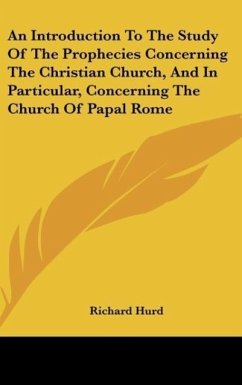Thomas Paine
Examination Of The Passages In The New Testament, Quoted From The Old And Called Prophecies Concerning Jesus Christ
Thomas Paine
Examination Of The Passages In The New Testament, Quoted From The Old And Called Prophecies Concerning Jesus Christ
- Gebundenes Buch
- Merkliste
- Auf die Merkliste
- Bewerten Bewerten
- Teilen
- Produkt teilen
- Produkterinnerung
- Produkterinnerung
To Which Is Prefixed An Essay On Dream, Showing By What Operation Of The Mind A Dream Is Produced In Sleep, And Applying The Same To The Account Of Dreams In The New Testament; With An Appendix Containing My Private Thoughts Of A Future State, And Remarks On The Contradictory Doctrine In The Books Of Matthew And Mark.
Andere Kunden interessierten sich auch für
![A Translation Of The Passages From Greek, Latin, Italian And French Writers, Quoted In The Prefaces And Notes To The Pursuits Of Literature (1798) A Translation Of The Passages From Greek, Latin, Italian And French Writers, Quoted In The Prefaces And Notes To The Pursuits Of Literature (1798)]() Thomas James MathiasA Translation Of The Passages From Greek, Latin, Italian And French Writers, Quoted In The Prefaces And Notes To The Pursuits Of Literature (1798)42,99 €
Thomas James MathiasA Translation Of The Passages From Greek, Latin, Italian And French Writers, Quoted In The Prefaces And Notes To The Pursuits Of Literature (1798)42,99 €![An Introduction To The Study Of The Prophecies Concerning The Christian Church, And In Particular, Concerning The Church Of Papal Rome An Introduction To The Study Of The Prophecies Concerning The Christian Church, And In Particular, Concerning The Church Of Papal Rome]() Richard HurdAn Introduction To The Study Of The Prophecies Concerning The Christian Church, And In Particular, Concerning The Church Of Papal Rome43,99 €
Richard HurdAn Introduction To The Study Of The Prophecies Concerning The Christian Church, And In Particular, Concerning The Church Of Papal Rome43,99 €![The Prophecies of Daniel and the Revelation of St. John: Viewed in Their Mutual Relations, With an Exposition of the Principal Passages The Prophecies of Daniel and the Revelation of St. John: Viewed in Their Mutual Relations, With an Exposition of the Principal Passages]() Adolph SaphirThe Prophecies of Daniel and the Revelation of St. John: Viewed in Their Mutual Relations, With an Exposition of the Principal Passages43,99 €
Adolph SaphirThe Prophecies of Daniel and the Revelation of St. John: Viewed in Their Mutual Relations, With an Exposition of the Principal Passages43,99 €![The Christian Faith Concerning The Holy Trinity The Christian Faith Concerning The Holy Trinity]() A Presbyter Of The Church Of EnglandThe Christian Faith Concerning The Holy Trinity37,99 €
A Presbyter Of The Church Of EnglandThe Christian Faith Concerning The Holy Trinity37,99 €![The Training Of The Twelve Or Passages Out Of The Gospels Exhibiting The Twelve Disciples Of Jesus Under Discipline For The Apostleship (1884) The Training Of The Twelve Or Passages Out Of The Gospels Exhibiting The Twelve Disciples Of Jesus Under Discipline For The Apostleship (1884)]() Alexander Balmain BruceThe Training Of The Twelve Or Passages Out Of The Gospels Exhibiting The Twelve Disciples Of Jesus Under Discipline For The Apostleship (1884)55,99 €
Alexander Balmain BruceThe Training Of The Twelve Or Passages Out Of The Gospels Exhibiting The Twelve Disciples Of Jesus Under Discipline For The Apostleship (1884)55,99 €![An Inquiry Into The Learning Of Shakespeare; With Remarks On Several Passages Of His Plays, In A Conversation Between Eugenius And Neander (1748) An Inquiry Into The Learning Of Shakespeare; With Remarks On Several Passages Of His Plays, In A Conversation Between Eugenius And Neander (1748)]() Peter WhalleyAn Inquiry Into The Learning Of Shakespeare; With Remarks On Several Passages Of His Plays, In A Conversation Between Eugenius And Neander (1748)37,99 €
Peter WhalleyAn Inquiry Into The Learning Of Shakespeare; With Remarks On Several Passages Of His Plays, In A Conversation Between Eugenius And Neander (1748)37,99 €![Lectures On The Prophecies Of Zechariah (1862) Lectures On The Prophecies Of Zechariah (1862)]() Ralph WardlawLectures On The Prophecies Of Zechariah (1862)48,99 €
Ralph WardlawLectures On The Prophecies Of Zechariah (1862)48,99 €-
-
-
To Which Is Prefixed An Essay On Dream, Showing By What Operation Of The Mind A Dream Is Produced In Sleep, And Applying The Same To The Account Of Dreams In The New Testament; With An Appendix Containing My Private Thoughts Of A Future State, And Remarks On The Contradictory Doctrine In The Books Of Matthew And Mark.
Hinweis: Dieser Artikel kann nur an eine deutsche Lieferadresse ausgeliefert werden.
Hinweis: Dieser Artikel kann nur an eine deutsche Lieferadresse ausgeliefert werden.
Produktdetails
- Produktdetails
- Verlag: Kessinger Publishing, LLC
- Seitenzahl: 74
- Erscheinungstermin: 22. Mai 2010
- Englisch
- Abmessung: 235mm x 157mm x 9mm
- Gewicht: 285g
- ISBN-13: 9781161678710
- ISBN-10: 1161678719
- Artikelnr.: 30944380
- Herstellerkennzeichnung
- Libri GmbH
- Europaallee 1
- 36244 Bad Hersfeld
- gpsr@libri.de
- Verlag: Kessinger Publishing, LLC
- Seitenzahl: 74
- Erscheinungstermin: 22. Mai 2010
- Englisch
- Abmessung: 235mm x 157mm x 9mm
- Gewicht: 285g
- ISBN-13: 9781161678710
- ISBN-10: 1161678719
- Artikelnr.: 30944380
- Herstellerkennzeichnung
- Libri GmbH
- Europaallee 1
- 36244 Bad Hersfeld
- gpsr@libri.de
Thomas Paine (born Thomas Pain[1]) (February 9, 1737 [O.S. January 29, 1736]- June 8, 1809) was an English-born American political activist, philosopher, political theorist, and revolutionary. He authored the two most influential pamphlets at the start of the American Revolution and inspired the patriots in 1776 to declare independence from Great Britain.[2] His ideas reflected Enlightenment-era ideals of transnational human rights.[3] Historian Saul K. Padover described him as "a corsetmaker by trade, a journalist by profession, and a propagandist by inclination".[4] Born in Thetford in the English county of Norfolk, Paine migrated to the British American colonies in 1774 with the help of Benjamin Franklin, arriving just in time to participate in the American Revolution. Virtually every rebel read (or listened to a reading of) his powerful pamphlet Common Sense (1776), proportionally the all-time best-selling[5][6] American title, which catalysed the rebellious demand for independence from Great Britain. His The American Crisis (1776-1783) was a pro-revolutionary pamphlet series. Common Sense was so influential that John Adams said: "Without the pen of the author of Common Sense, the sword of Washington would have been raised in vain".[7] Paine lived in France for most of the 1790s, becoming deeply involved in the French Revolution. He wrote Rights of Man (1791), in part a defense of the French Revolution against its critics. His attacks on Anglo-Irish conservative writer Edmund Burke led to a trial and conviction in absentia in England in 1792 for the crime of seditious libel. The British government of William Pitt the Younger, worried by the possibility that the French Revolution might spread to England, had begun suppressing works that espoused radical philosophies. Paine's work, which advocated the right of the people to overthrow their government, was duly targeted, with a writ for his arrest issued in early 1792. Paine fled to France in September where, despite not being able to speak French, he was quickly elected to the French National Convention. The Girondists regarded him as an ally. Consequently, the Montagnards, especially Maximilien Robespierre, regarded him as an enemy. In December 1793, he was arrested and was taken to Luxembourg Prison in Paris. While in prison, he continued to work on The Age of Reason (1793-1794). James Monroe, a future President of the United States, used his diplomatic connections to get Paine released in November 1794. Paine became notorious because of his pamphlets. The Age of Reason, in which he advocated deism, promoted reason and free thought and argued against institutionalized religion in general and Christian doctrine in particular. He published the pamphlet Agrarian Justice (1797), discussing the origins of property and introduced the concept of a guaranteed minimum income through a one-time inheritance tax on landowners. In 1802, he returned to the U.S. When he died on June 8, 1809 only six people attended his funeral as he had been ostracized for his ridicule of Christianity








